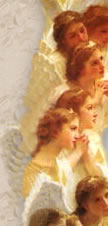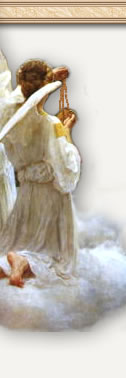




 |
|

|
|
|||||||||||
|
|
|
|
||||||||||||
 |
|
|
||||||||||||
 |
|
 |
|
|||||||||||
|
|
||||||||||||||
 |
 |
|
|
|
|
A Priest´s First Tridentine
Mass You could say I'm a recent convert to the Tridentine Mass. I have only been ordained five years, and I had very little contact with, it until after my ordination. We were asked by Bishop Brewer to have the old Mass at English Martyrs and we were, to be honest, a bit reluctant because we weren't terribly sure what it was all about. My first time celebrating the Mass, or rather the week or so before, was a nightmare. It all seemed so strange, so remote from my experience of Mass. The many rubrics and numerous stage-like directions to be remembered seemed so complicated and unnecessary. Would anyone notice if I forgot something? Couldn't I just simplify things a little? As the bell rang and I heard the congregation getting to its feet the nightmare continued. I was very much aware of the truly awesome moments looming before me. Would I remember everything? I prayed I wouldn't forget that I was saying Mass amid my preoccupation with remembering what to do and when to move, when to make the Sign of the Cross, and so on. Once the biretta was safely in the server's hand, the chalice was on the corporal, and the Missal opened, I genuflected and off we went. From that moment things settled down, the Mass began, and while the nerves didn't disappear, they were no longer controlling me. I think fear of the old is often as hard to cope with as fear of the new. When the Mass was over (and I am sure I didn't make too many mistakes), the church locked, and a gin and tonic poured into a slightly larger glass than usual, there came a time to reflect. What had appeared a nightmare ended as a spiritual experience different from anything I had experienced before. But what made it so different and why did I feel so different? Above all, there was a powerful sense of the presence of God. It was a feeling of the majesty of the Father, the comfort and warmth of the Holy Spirit, the forgiving and gentle guidance of Our Blessed Lord in that Mass. Could it have been because this was a new experience? Or was it greater than that? I remembered something along these lines I once heard in a lecture on Spiritual Theology. Father Jordan Aumann had spoken of the liturgy as a major source of inspiration for the spiritual life. On looking up his words I was struck by this passage: "The link between tradition and the liturgy is manifested in such statements as ‘Lex orandi est lex credendi—the law of prayer is the law of belief.' The liturgy is thus an expression of the vital continuity and perennial unity of the Church's proclamation of the revealed truths to all nations throughout the centuries. As regards the Magisterium, Pope Pius XI referred to the liturgy as ‘The principal organ of the Magisterium of the Church'." (Jordan Aumann, O.P., Spiritual Theology, Sheed & Ward, London, 1986, p. 29). Tradition is the transmission of the deposit of faith from one generation to another under the teaching guidance of the Church. This tradition proclaims, explains and applies revealed truths to the people of God throughout the centuries. While human traditions are often subject to error, the living tradition of the Church is infallible regarding the essential content of the Faith. Liturgy is the public worship of the Church. It is the form of piety practiced by the Church in fulfillment of her mission to praise and glorify the Blessed Trinity and to sanctify souls. Through this public worship we are able to express our belief in the truths of our Faith and to show others the mystery of Christ and the real nature of His Church. In other words, the liturgy is not simply a necessity of duty, it is a living expression of what we believe, and of the life we live in the Blessed Trinity. This is part of the "vital continuity" Fr. Aumann refers to—the same faith believed by all people everywhere, at all times. The guaranteed continuity of this tradition is what gives life to Christ's Mystical Body, the Church. That body must not be divided; hence Fr. Aumann's phrase, "perennial unity," the unity of all believers holding the same Faith which has been preserved and passed on from generation to generation. The present Holy Father emphasizes tradition and unity in his Apostolic Letter Ecclesia Dei: "It is impossible to remain faithful to the tradition while breaking the ecclesial bond with him to whom, in the person of the Apostle Peter, Christ Himself entrusted the ministry of unity in His Church" (Ecclesia Dei, para. 4, quoting Pastor Aeternus of Vatican I). Tradition, liturgy and the oneness of the Church are essential to our understanding of the place the traditional rite of Mass holds in the contemporary Church. At that extraordinary event, my first Latin Mass, we were uniting ourselves in this traditional rite to the living tradition of the Church. We weren't setting ourselves up as something different; we were a living part of that tradition, moving on, moving forward. Meanwhile, liberal liturgists continue to show only contempt for traditional forms and common sense. Let me relate a little story. A liturgist came to see a friend of mine, telling him he needed to change his church, to "update and re-order." And my friend replied, "Okay, what am I to do?" "You must move the altar nearer to the people." So my friend said, "If I move the altar nearer to the people, there will be no room in the sanctuary." To which the liturgical expert had a ready answer: "Well, take out the first six rows of benches!" And these are the "experts"! These very liturgists speak of the majesty of ancient rites, of the wonder of baptisms as celebrated in fifth-century Syria, and so on; but one mention of the Tridentine Mass and it's as though you asked them to deny the very existence of God. For some reason, they have a fear of the old Mass. What they seek is change, and with a familiar liberal dogmatism, they denounce anyone who disagrees with their point of view. While condemning the Tridentine Mass and those who desire its use, they condone personal changes made in the normative Mass under the guise of legitimate experience of liturgy. Liturgists insist that the liturgy must be readily understandable and accessible to everyone. Under this pretext they have reduced the form of the Church's worship to the lowest possible common denominator. They have taken any notion of the sacred, any notion of sacrifice, and reduced it to "How do I feel?" or "Where are you at'?" or "Where are we going?" Surely the liturgy is not about that. The liturgy exists for the glorification of God and the sanctification of souls. Its purpose is not to make me feel happy and comfortable. It is for me to bring myself and offer myself with my Savior to the Father in heaven. This search for a lowest common denominator carries with it the patronizing assumption that laymen lack the ability to see for themselves the wonders of the traditional liturgy. Extra explanations have therefore been provided and ceremonies simplified to the point where they mean absolutely nothing. For this reason, I was particularly delighted to read Cardinal Ratzinger's recent address to the Lebanese bishops who were in Rome for a synod. In speaking to them about their liturgy, based on the document they were discussing, he said, quoting from that document: "‘....many await a deeper reform and a true renewal of prayers, texts, and books. They ask that they be better adapted to the language of the people and their mentality...' I wonder: what is the mentality of the people? Are we thinking here about a superficial mentality, created and homogenized by the communication media, or are we thinking about the simple of heart, whose eyes of faith see that which remains hidden to the...wise and understanding (cf. Mt. 1 1:25)? Following the first line of thought, one quickly arrives at the banalization of the liturgy. We have some sad examples of this in the West; the East should not follow this erroneous path" (L'Osservatore Romano, January 10, 1996). Strong words and a suitable warning to the East; let us pray they take the good Cardinal's counsel! Ratzinger went on to say that with a great deal of respect and love, the texts may be changed sometimes, but the real reform needs to be in people's hearts and in a renewed liturgical education in prayer. Above all, he says: "Our Lord must precede our action. With the disciples we must...go to the Lord saying: ‘Lord, teach us to pray'.... Guided by the Lord we will find the way." The changes introduced to modernize the Mass and make it more accessible and understandable have hardly proved to be the success the experts predicted. Cardinal Ratzinger's plea that the only way to bring about a true and profound reform is through prayer is surely a step in the right direction. How often have we heard: change this and change that, we are a community, this will be better for the community, this will let us share together? On it goes with little or no mention of God and prayer. How often are we asked to pray for the good of the Church, to pray for the bishops and priests, to pray for the spread of the Gospel? We have heard arguments time and again to the effect that the early Church observed such and such a practice, and that it must therefore be right and worthy of restoration. But liturgical archaeology is hardly a part of a living tradition. The liturgical reformers tell us that at the time of the Council of Trent, the academics didn't have the means to find out this wonderful stuff they have discovered about baptisms in fifth-century Syria. Well, what does it matter? The liturgists at the Council of Trent were not there to change any rites. They were there to forge a unity to fight against the Reformation. They wanted Catholics everywhere to believe the same things—beliefs that had been passed on from generation to generation. They were not changing the Mass so that people everywhere in the world would feel more comfortable, more at home, more at ease. No, they were fighting off an enemy—an enemy that was trying to destroy the deposit of faith which had been passed down from the apostles. The place for the traditional Mass in the life of the Catholic Church today, I believe, is vital. Its focus is God, not man. There is no confrontation between the priest and the people, and therefore, there is no need for the priest to feel he has to entertain the body in front of him. It is difficult to ignore people you are looking at directly. And so priests have been pressured to entertain, their minds taken away from what they are there to celebrate. The secularism of our age has led many priests to believe that man comes first. The old Mass, on the other hand, cries out the very opposite. So all the fears I mentioned at the beginning—e.g., the vast number of rubrics and stage-managed movements—are not repressive, as I first thought. Rather, they enable a freedom which has gone from the Mass as it is now. Rubrics and canon law are both essential, for they are our security and our freedom. They give us the freedom to concentrate on the truths we are there to celebrate. A lack of rules does not equal freedom; it equals chaos, and that is where the new rite has gotten us—to a state of chaos. Liturgical rules enable the priest and the people to be completely free to absorb themselves in the great mystery they are celebrating. This is true participation; this is accessible and understandable worship. How can we honestly refer to swinging in the aisles and waving one's hands in the air as participation? Such behavior may satisfy the ego for a moment but nothing of it speaks of eternity; it confines souls to the present. The old Mass is timeless, as should the new Mass be equally timeless. All time is brought together when Christ's Mystical Body gathers to celebrate the Passion, death and Resurrection of the Savior, and should not be lost in a few moments of something verging on hysteria. Liturgy is about the worship of Almighty God and the sanctification of the world; it has nothing to do with being entertained by a priest who looks like an out-of-place, second-rate comedian. We have been having governors' meetings all week and there has been no end of talk of "mission statements." I finally stood up and declared the whole spectacle preposterous. Our Lord gave us the mission statement: "Go out and teach all nations, baptizing them in the name of the Father, Son and Holy Ghost." That is the mission statement of us all as Christians. Let us make that our mission statement. We all share the mission of Our Blessed Lord. The Church takes this mission seriously, for she exists for the sanctification of souls. It is for this reason that the Mass ends with "Ite missa est—Deo gratias." Here is that living tradition of the Church at work; after "Go, you are sent" surely "Thanks be to God" is the most fitting response we can make. By it we are prepared to go out into the world and to take with us the Church's mission of teaching to all nations. We have been given the grace of the Mass; now let us take the message of the Gospel with us to bring others to join in this most holy mystery. But how can we bring people in when all they are going to get is a priest sporting Mickey Mouse ears? I have celebrated the Tridentine Mass many times now and each time I am more aware of the priceless gift we have in the traditional liturgy, more aware of the freedom an timeless nature of this worship of the Trinity. There is no need for any priest to think constantly of new ways to keep people's attention, or any need to amuse the audience with funny stories. So many things have been removed from our churches: statues, vestments, music and even choirs, to say nothing of doctrine and prayer; the list, alas, is too long to contemplate. We have a duty to preserve beauty in all its forms. The Tridentine Mass is indeed one of those priceless treasures we have. It must not be forgotten, nor should its spiritual benefits be overlooked. This great gift must never be considered a source of embarrassment. On the contrary, be proud of the love you have for the old Mass; never allow yourself to be put down or ridiculed by those who criticize it while knowing nothing about it. |
|



♦ About The Mass ♦ Resources ♦ How To Help ♦ Contact Us ♦